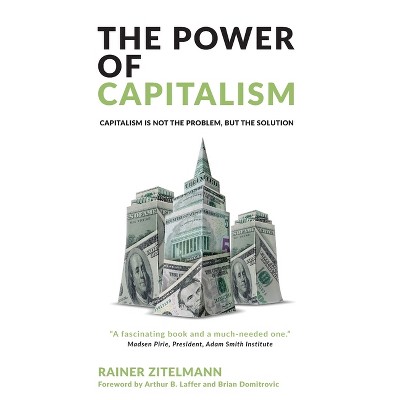Sponsored

Nigerian Capitalism - by Sayre P Schatz (Hardcover)
$95.99
In Stock
Eligible for registries and wish lists
Sponsored
About this item
Highlights
- Following a surge in oil revenues in the 1970s, Nigeria became one of Africa's most rapidly developing nations.
- Author(s): Sayre P Schatz
- 308 Pages
- Business + Money Management, Economics
Description
About the Book
Following a surge in oil revenues in the 1970s, Nigeria became one of Africa's most rapidly developing nations. In Nigerian Capitalism, Sayre P. Schatz analyzes the country's political economy, assessing its position and proposing a development plan for the final quarter of the twentieth century. Referring to Nigeria's economic development strategy as "nurture-capitalism," Sayre contrasts the role of private enterprise, which is expected to foster growth of the productive sector of the economy, with the government's role, which is to nurture the capitalist sector generally and to favor indigenous enterprise in particular. The author examines the development of Nigerian nurture-capitalism from 1949 to the launching of and early experience with the Third Plan (1975-80), with emphasis on the post-civil war 1970s. He then turns to an intensive study of indigenous business and possible impediments to the development of Nigerian private enterprise, analyzing the role of capital availability, entrepreneurship, and the economic environment. Sayre demonstrates that there are substantial divergences between private profitability and social utility and that there is an abundance of socially useful investment possibilities for indigenous businessmen. The author next turns to a study of the government business-assistance programs, and their economic, administrative, and political characteristics. Finally, he assesses the sources of successful investment and makes a case for enhanced socially useful investments. Comparing "pragmatic developmentalism," "pragmatic socialism," and "thoroughgoing socialism," he proposes a pragmatic orientation that postpones ideological decisions as long as practicable.This title is part of UC Press's Voices Revived program, which commemorates University of California Press's mission to seek out and cultivate the brightest minds and give them voice, reach, and impact. Drawing on a backlist dating to 1893, Voices Revived makes high-quality, peer-reviewed scholarship accessible once again using print-on-demand technology. This title was originally published in 1977.
Book Synopsis
Following a surge in oil revenues in the 1970s, Nigeria became one of Africa's most rapidly developing nations. In Nigerian Capitalism, Sayre P. Schatz analyzes the country's political economy, assessing its position and proposing a development plan for the final quarter of the twentieth century. Referring to Nigeria's economic development strategy as "nurture-capitalism," Sayre contrasts the role of private enterprise, which is expected to foster growth of the productive sector of the economy, with the government's role, which is to nurture the capitalist sector generally and to favor indigenous enterprise in particular. The author examines the development of Nigerian nurture-capitalism from 1949 to the launching of and early experience with the Third Plan (1975-80), with emphasis on the post-civil war 1970s. He then turns to an intensive study of indigenous business and possible impediments to the development of Nigerian private enterprise, analyzing the role of capital availability, entrepreneurship, and the economic environment. Sayre demonstrates that there are substantial divergences between private profitability and social utility and that there is an abundance of socially useful investment possibilities for indigenous businessmen. The author next turns to a study of the government business-assistance programs, and their economic, administrative, and political characteristics. Finally, he assesses the sources of successful investment and makes a case for enhanced socially useful investments. Comparing "pragmatic developmentalism," "pragmatic socialism," and "thoroughgoing socialism," he proposes a pragmatic orientation that postpones ideological decisions as long as practicable.This title is part of UC Press's Voices Revived program, which commemorates University of California Press's mission to seek out and cultivate the brightest minds and give them voice, reach, and impact. Drawing on a backlist dating to 1893, Voices Revived makes high-quality, peer-reviewed scholarship accessible once again using print-on-demand technology. This title was originally published in 1977.
Dimensions (Overall): 9.0 Inches (H) x 6.0 Inches (W) x .81 Inches (D)
Weight: 1.31 Pounds
Suggested Age: 22 Years and Up
Number of Pages: 308
Genre: Business + Money Management
Sub-Genre: Economics
Publisher: University of California Press
Theme: General
Format: Hardcover
Author: Sayre P Schatz
Language: English
Street Date: June 14, 2024
TCIN: 1005685501
UPC: 9780520414921
Item Number (DPCI): 247-47-5366
Origin: Made in the USA or Imported
If the item details aren’t accurate or complete, we want to know about it.
Shipping details
Estimated ship dimensions: 0.81 inches length x 6 inches width x 9 inches height
Estimated ship weight: 1.31 pounds
We regret that this item cannot be shipped to PO Boxes.
This item cannot be shipped to the following locations: American Samoa (see also separate entry under AS), Guam (see also separate entry under GU), Northern Mariana Islands, Puerto Rico (see also separate entry under PR), United States Minor Outlying Islands, Virgin Islands, U.S., APO/FPO
Return details
This item can be returned to any Target store or Target.com.
This item must be returned within 90 days of the date it was purchased in store, shipped, delivered by a Shipt shopper, or made ready for pickup.
See the return policy for complete information.
Trending Non-Fiction

$19.31
was $20.98 New lower price
4 out of 5 stars with 65 ratings

$18.28
was $19.58 New lower price
4.7 out of 5 stars with 17 ratings

$4.59
MSRP $7.99
Buy 2, get 1 free select books
4.8 out of 5 stars with 123 ratings

$6.20
MSRP $10.95
Buy 2, get 1 free select books
4.8 out of 5 stars with 33 ratings

$7.09
MSRP $9.99
Buy 2, get 1 free select books
4.9 out of 5 stars with 46 ratings












